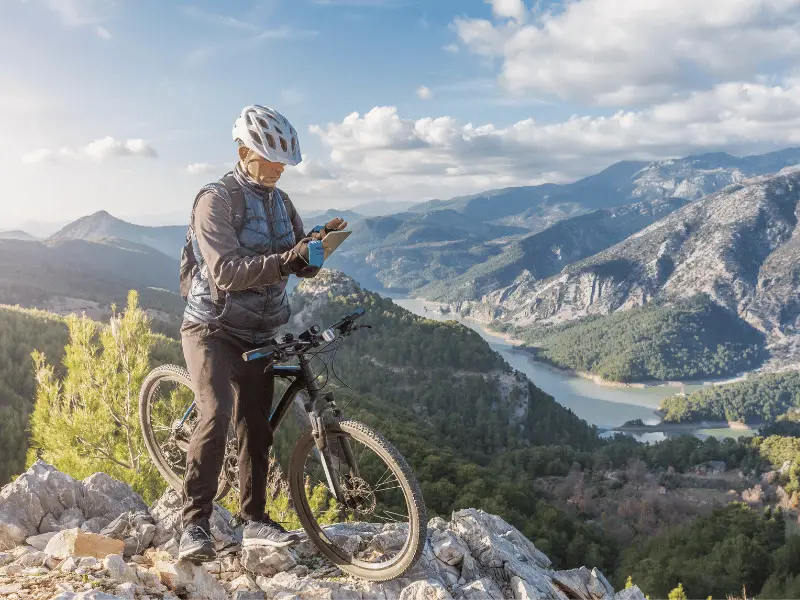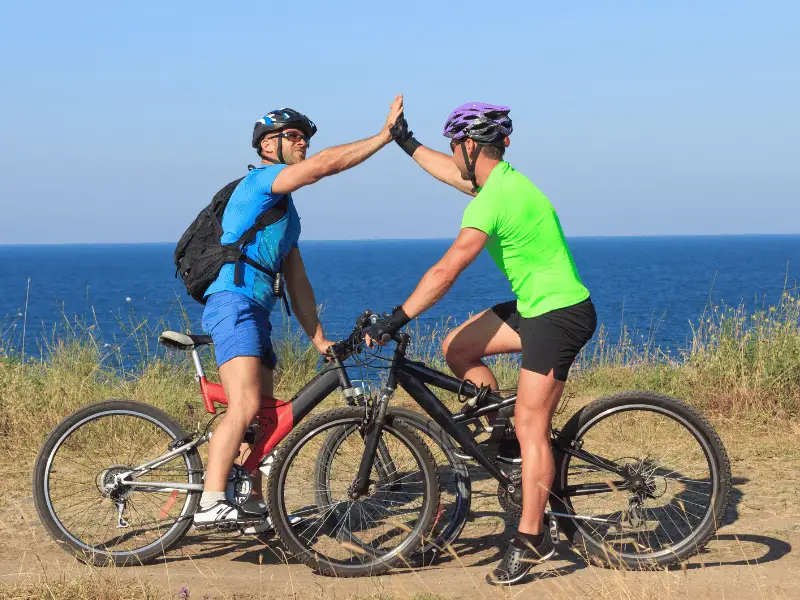
Are you worried that you might be too old to keep up with the rigors of mountain biking? Perhaps you’re concerned that your aging body won’t be able to handle the intense physical demands of off-road cycling.
But the good news is, with the right mindset and approach, you can keep mountain biking well into your golden years.
In this post, we’ll explore the benefits of mountain biking for older adults, and share some tips and strategies to help you stay active and safe on the trails.
Whether you’re a seasoned rider or just getting started, this post will give you the inspiration and confidence you need to keep pushing the limits and exploring new trails, no matter what your age. So let’s get started!
Is mountain biking good for older adults?
Mountain biking is an excellent form of exercise and recreation for people of all ages, including older adults. Here are some of the reasons why:
- Low-impact exercise: Mountain biking is a low-impact exercise that can be gentler on the joints than other forms of exercise like running. This makes it an excellent option for older adults who may have arthritis or other joint conditions.
- Cardiovascular fitness: Mountain biking can help improve cardiovascular fitness and reduce the risk of heart disease. The aerobic nature of the activity helps increase heart rate and oxygen intake, which strengthens the heart and lungs.
- Balance and coordination: Mountain biking requires a lot of balance and coordination, which can help improve these skills as we age. This is important for maintaining mobility and preventing falls.
- Stress relief: Spending time in nature and engaging in physical activity can help reduce stress and improve mental health. This is especially important for older adults, who may be dealing with more stressors and health concerns.
- Socialization: Mountain biking is a great way to meet new people and build a sense of community. Older adults who may be retired or have more free time can benefit from the social aspect of the sport.
While mountain biking can be challenging, older adults can start at their own pace and gradually build up their skills and endurance. It’s important to consult with a doctor before starting any new exercise routine and to choose trails and terrain that are appropriate for your skill level.
With the right approach, mountain biking can be a great way for older adults to stay active and enjoy the outdoors
Is mountain biking hard on your body?
Mountain biking is a physically demanding sport that can put stress on various parts of the body. However, with the right preparation and precautions, it can be a safe and healthy form of exercise.
Here are some of the ways that mountain biking can impact your body:
- Joints and bones: The impact of riding over rough terrain can put stress on the joints and bones, especially in the knees, ankles, and wrists. It’s important to choose appropriate trails and use proper form to reduce the risk of injury. Using full-suspension bikes or adding a suspension seat post can also help absorb shock and reduce stress on the body.
- Muscles: Mountain biking uses a variety of muscle groups, including the legs, core, and upper body. While this can help improve strength and fitness, it can also cause muscle soreness and fatigue. It’s important to properly warm up and cool down, stretch, and gradually increase the intensity and duration of your rides.
- Skin and soft tissue: Mountain biking can cause scrapes, bruises, and other skin injuries from falls or contact with plants or other objects on the trail. It’s important to wear appropriate protective gear and clothing to reduce the risk of injury.
- Eyes and ears: Riding at high speeds or on dusty trails can cause eye irritation or damage, while exposure to loud noise from the wind or other riders can cause hearing damage. It’s important to wear appropriate eye and ear protection.
Overall, mountain biking can be a safe and healthy form of exercise as long as you take appropriate precautions and prepare your body for the demands of the sport.
Proper training, protective gear, and trail selection can all help reduce the risk of injury and ensure a safe and enjoyable ride.
At what age should I stop mountain biking?

There is no specific age at which you should stop mountain biking. The decision to continue or stop should be based on your own physical and mental health, as well as your personal preferences and risk tolerance. Here are some factors to consider:
- Physical health: As we age, our bodies may become more susceptible to injury or may have more difficulty recovering from injuries. It’s important to listen to your body and consult with a doctor if you have any health concerns that may impact your ability to ride safely. In general, if you have a chronic condition that makes mountain biking unsafe or uncomfortable, it may be time to consider alternative forms of exercise.
- Risk tolerance: Mountain biking involves inherent risks, such as falls, collisions with objects or other riders, and exposure to the elements. As we age, our risk tolerance may decrease, and we may become more cautious or hesitant to take on certain challenges. It’s important to be honest with yourself about your comfort level and not push yourself beyond your limits.
- Mental health: Mountain biking can be a mentally challenging activity that requires focus, concentration, and quick decision-making. As we age, our cognitive abilities may decline, and we may find it more difficult to handle the mental demands of the sport. If you feel like you are no longer able to ride safely or enjoyably due to cognitive changes, it may be time to consider other activities.
Ultimately, the decision to continue or stop mountain biking should be based on a careful assessment of your own health and abilities, as well as an understanding of the risks and rewards of the sport.
If you do choose to continue, it’s important to take appropriate precautions and make any necessary adjustments to ensure a safe and enjoyable ride.
Final Thoughts
In conclusion, age should not be the sole determining factor in whether or not you continue to enjoy the sport of mountain biking. With the right preparation, precautions, and mindset, it’s possible to safely and enjoyably ride well into your later years.
By taking care of your body, choosing appropriate trails, and being honest with yourself about your physical and mental abilities, you can continue to enjoy the health and wellness benefits of mountain biking for many years to come.
